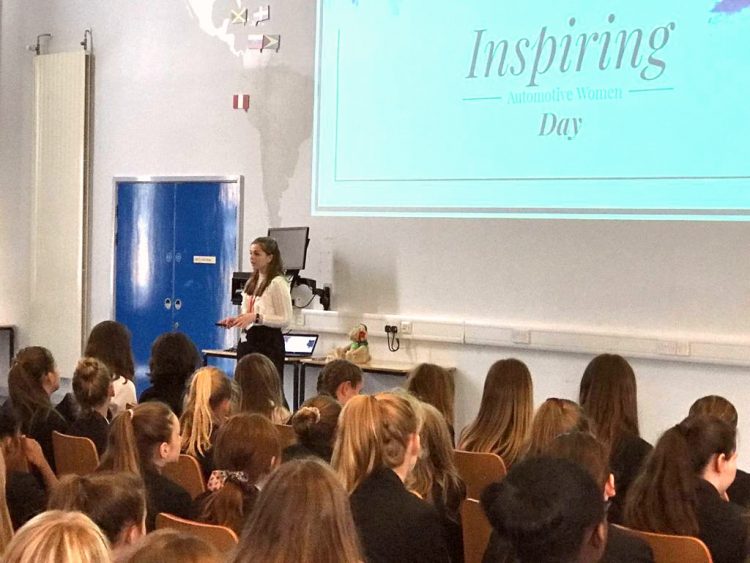Do career talks really have a positive impact on school pupils?
 At the UK Automotive 30% Club, we pride ourselves on the work we do to encourage more females into the sector. Our annual Inspiring Automotive Women Day, which consists of two parts, reaches out to female secondary pupils with the aim of inspiring them to consider careers in the automotive industry.
At the UK Automotive 30% Club, we pride ourselves on the work we do to encourage more females into the sector. Our annual Inspiring Automotive Women Day, which consists of two parts, reaches out to female secondary pupils with the aim of inspiring them to consider careers in the automotive industry.
For the day event this year, we invited 100 female secondary school pupils to connect with 30 Inspiring Automotive Women volunteers at the Volkswagen Group UK’s National Learning Centre. Pupils engaged in a number of activities, a panel session and a career speed networking session, totalling 1,274 encounters with people from the world of work* 98% of which were meaningful (based on how many scores of 3 and 4 received for each activity).
The Inspiring Automotive Women Day school visits connect volunteers from within our member companies to schools across the country to present a 30-40 minute ‘career talk’ to their female pupils, with the aim of the pupils gaining a greater understanding of the wide variety of jobs available to both men and women across the sector.
We know that outreach activities like those undertaken by our members have a hugely positive impact on the youngsters they meet, due to evidence based research. The Education and Employers charity recently published a comprehensive report which suggests that careers talks to pupils aged 15-16 from people from the world of work, can have a positive impact on their GCSE results.
Their report draws data from approximately 650 students in their GCSE year from across 5 schools in England. Students were divided into two groups, one of which received three extra career talks by volunteers from the world of work. This was on top of their usual career activities organised by their school.
Each of the three speakers visited the participating schools for a 20-30 minute session with a focus on discussing the advantages of working hard on their studies, revising for an appropriate amount of time and the importance of doing well in their exams while talking through their career pathways.
To explore the changes between the two groups, the research team designed three surveys for completion by the students at different stages in the trail; a baseline survey for all participants, a post followup survey for the students who received the additional three careers talks, and an end of year final survey for all participants. The results of students’ Science, Maths and English GCSEs were also collected and compared against predicted grades to create a measure of “academic outperformance”.
Here are the highlights from the results of the surveys
- Rating of their experience with employers – 44% of the students felt that the career talks they received had been a good use of their time,
- Impact on career and education choices – It is noteworthy that a total of 7% (20 people) said the talks had made them change their choices in either career or education pathway, of whom 3 people said it changed their choices in both areas
- Impact on student attitudes – Over 70% of participants said the talks made them more motivated at school to some extent, with a small but significant group of people saying it made them a lot more motivated for exams (22%) and a lot more positive towards school (17%).
- Impact on motivation to study harder – On average, students who attended the three career talks reported an increase of 2.7 weekly hours on a baseline mean of 13.7 hours (i.e. a 20% increase in planned revision hours).
- Headline findings – The analysis reveals an indicative, direct link between the career talks and students’ outperforming their predicted grades, the equivalent of one student in a class of 25 beating their predictions by one grade as a result of the career talks
To view the Education and Employers full report please click here.
We would like to continue to build upon the fantastic work that our volunteers do, and with this in mind, we would encourage each and every one of you reading this article to join our volunteer network by ticking the relevant box upon subscribing to Inspiring E-Zine. You can update your account preferences here.
*An encounter with people from the work of work – Schools in England are now required to ensure that all young people engage with employers every year of their secondary education
You may also be interested in this report by the Education and Employers charity which suggests career gender stereotyping exists, and can be tackled from primary school onwards (Drawing The Future Report)
